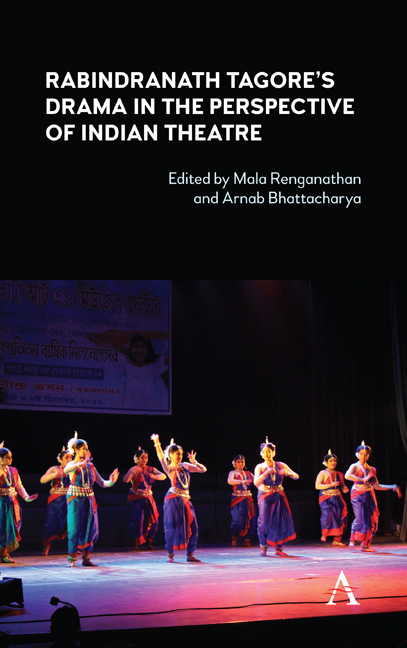The Understudied Dramatic Aesthetics of Rabindranath Tagore
Published online by Cambridge University Press: 20 January 2022
Summary
It is indeed an honour for us, as editors of the volume titled Rabindranath Tagore's Drama in the Perspective of Indian Theatre, to contribute to Tagore studies and promote/enrich scholarship on the dramatic works of Rabindranath Tagore (1861–1941), Asia's first Nobel laureate. Tagore, lauded primarily for his poetry, has left a voluminous amount of dramatic literature that has gained recognition only from the recent decades. Primarily a poet, Tagore was no less a playwright than a poet or fiction writer, a fact proved by his reasonably vast opus comprising more than 40 plays. Tagore's drama, a substantial part of which is written in verse, demonstrates his creative transformation of the Indian dramatic tradition, submerged in his unique and highly original philosophy of life and art. Perhaps due to inadequate translations or biased notions on his plays as not stage worthy, Tagore's plays have not been mapped properly in the history of the Indian stage. It is only in the past two decades that Tagore's place in the local as well as global environs has been realized in relation to his plays, which are now seen to be decisive to an understanding of his philosophy of life, his social and political consciousness and his spiritual affinities.
Similarly, while Tagore's plays have been critiqued, they have been rarely seen in the context of his contributions to the Indian dramatic genre, particularly focusing on his cosmopolitan spirit, his classic style of blending arts, his spirit of fusion and his effort to modernize theatre. Therefore, our aim here is to map the poet-dramatist's place in Indian drama and performance, since his plays cover a wide variety of dramatic forms from folk plays, dance dramas to operatic forms as well as from prose plays, humorous plays and children's plays to political and social plays. Despite being a world traveller with an awareness of the Western classical dramatic styles, Tagore never compromised Indian cultures to Western dramatic forms or Western styles of staging. His plays take the dramatic sweep typical of Kalidasa and at the same time, they do situate the plays within the contemporary context of experimentation and renaissance fervour, giving his plays a new technique, a new identity, a new dramatic method.
- Type
- Chapter
- Information
- Publisher: Anthem PressPrint publication year: 2020



